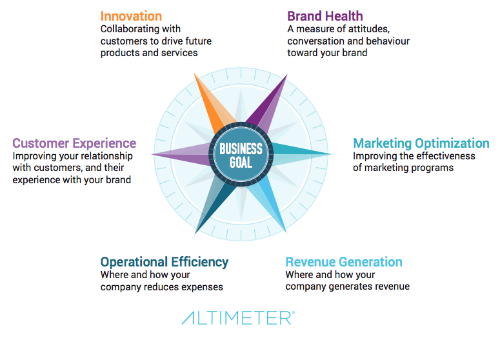
A Framework to Measure Real Business Impact
It’s safe to say that in 2015, the vast majority of businesses are creating content for marketing (B2C 77%, B2B 86%) 2015 CMI/MarketingProfs.But to what end?
Content can create impact for a business in many ways, including boosting reputation, increasing revenue, improving operational efficiencies or growing the value of the brand.
Unfortunately, most companies are chasing ROI instead of planning for measuring the full spectrum of value content can deliver for a business.
This is the challenge content strategists and digital marketers are facing in conference and boardrooms all over the world. Business executives are no longer satisfied with metrics around volume and are demanding insight into impact of content marketing investments.
Performance of content marketing investments is what business leaders need and it’s a framework for measuring the impact of content that they will get in a new report from my pals Rebecca Lieb and Susan Etlinger from Altimeter Group called, Content Marketing Performance: A Framework to Measure Real Business Impact.
Some of the key findings from the research:
- Marketers find measurement to be the single most formidable content marketing challenge.
- Measurement is irrelevant unless the organization establishes appropriate KPIs at the outset.
- Measurement focus is often too narrow. Looking exclusively at sales disregards too many other objectives that can deliver monetary value. Conversely, volume measurement is frequently disconnected from business objectives.
- An ever-broadening range of tools, media, channels and integrations expands the possibilities for measuring content while complicating the measurement equation.
- While marketers say measurement is a primary need, they are making content software investments elsewhere.
- Finally, content marketing has demonstrable value for business divisions outside of the marketing organization. Metrics proving this value are the strongest way to evangelize participation in content marketing; a tremendous and often untapped potential.

Inside the report you’ll find an overview of current trends and a framework for content measurement – all the ways content can deliver business impact for a company.
Then there are 6 content measurement case studies covering each area of the framework:
- Brand Health – Seattle Seahawks
- Marketing Optimization – Rokenbok
- Revenue Generation – Zenni Optical & Stouffer’s
- Operational Efficiency – Unilever
- Customer Experience – Sony
- Innovation – Domino’s
Each case study provides a problem > approach > core metrics model. Companies that want to better measure marketing performance will learn some important lessons in these stories. Businesses that want to tap into the full spectrum of value that content can deliver will get even more.
In the end, Rebecca and Susan provide 4 essential recommendations for better measuring content effectiveness. Here are the highlights:
- Measurement must be the foundational principle of content strategy
- Every measurement strategy must focus on business outcome
- Know your metrics and your data
- Be realistic about organizational capabilities and tools
There’s more detail on each of these recommendations, just download the report to see the complete document.
The volume and participation in content creation within and outside of organizations is only going to increase. Without a proper measurement framework, there’s a lot being left to chance – no exactly the best approach to business.
No comments:
Post a Comment